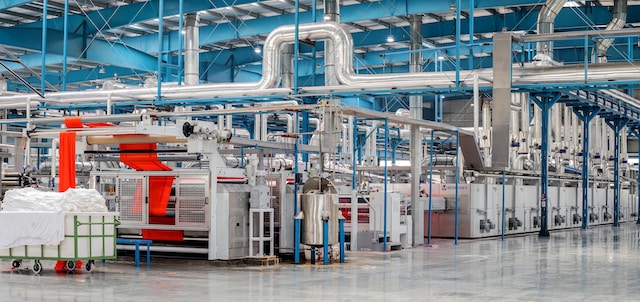More than 2 million workplace injuries occurred in the United States in 2021, according to the Bureau of Labor Statistics (BLS). These accidents cost a lot of money and a loss of hundreds of thousands of hours of work time for both individuals and employers.
By practicing industrial hygiene, businesses can safeguard their workforce against hazards like chemical exposure, noise pollution, and physical hazards. That can benefit employees and employers.
In order to create a safe working environment for employees and managers in industrial settings, this article discusses how essential it is to maintain industrial hygiene.
What Is Industrial Hygiene?
Industrial hygiene is a subfield of occupational security that focuses on identifying, evaluating, and managing workplace hazards that could cause illness, injury, or impairment. Its purpose is to minimize workers’ risk of being exposed to dangerous circumstances and substances when working.
Industrial hygiene includes various disciplines, similar to toxicology, planning, science, actual science, and the investigation of illness transmission. Modern hygienists identify and evaluate word-related risks in different ways, including air assortment, noise testing, and ergonomic evaluations. They come up with and put into action strategies to lessen or eliminate the dangers that can affect workers in industrial environments. So, below are some ways maintaining industrial hygiene can benefit employers.
1. Consistency with the Rules
There are rules for employers to protect their workers from word-related dangers like health risks, ergonomic risks, and exposure to dangerous materials. By maintaining industrial cleanliness, businesses can ensure compliance with these regulations and avoid costly fines and prison issues.
While employers can hire industrial hygienists for their workplace, they can also have an in-house team member look after it for themselves. In that case, workers could consider enrolling in online industrial hygiene programs like a Master of Science in Public Health (MSPH) in Industrial Hygiene. Students learn to think logically about workplace health and safety through such programs. Toxicology, data representation, and the study of disease transmission are taught so that students can create effective safety guidelines that can safeguard workers.
In addition to educational programs, workplaces must also consistently read about new updates on laws on industrial hygiene to ensure they comply with all of them. In turn, there’s minimal risk of running into costly lawsuits.
2. Increase in Productivity
When the workplace is designed for safety and cleanliness, employees are more likely to finish their work efficiently. Employees who work in safe conditions may be at lower risk of diseases, injuries, and other medical problems, resulting in fewer days off and improved efficiency.
In order to maintain a high level of indoor air purity and prevent the spread of airborne diseases, using air purification equipment and ensuring adequate airflow are also helpful. In turn, employees can also feel comfortable in their workspace, which may allow them to stay focused on their work.
3. Reduced Costs Associated with Medical Services
Workers are less likely to become ill or injured when risks are reduced, which reduces costs associated with medical services and treatments. Employees may also be exposed to hazardous chemical compounds like mold, gases, or dirt that should irritate their respiratory systems if a company does not provide adequate ventilation. Staff members may require medical attention or even hospitalization as a result.
4. Better Public Image
Companies that emphasize industrial hygiene can boost their reputation by demonstrating their dedication to the health and safety of their employees, customers, and the general public. Some clients may even choose to work with a company that goes above and beyond to provide safe and healthy work environments for their industrial workers.
5. Happier Employees
Below are some ways industrial hygiene can lead to happier employees.
- Improved physical well-being: Modern hygiene practices can help reduce illnesses and accidents. When employees are in good health, they are able to carry out their responsibilities at work more effectively, which results in increased output and efficiency.
- Satisfaction at work: It is more likely for an employee to feel content with their employer if they believe their employer values their safety and well-being. That can help increase productivity in the workplace.
- Raised morale: A work environment that emphasizes safety for its workforce by controlling the risk of hazards can help create a work environment built on trust and appreciation for every team member. That can help improve workplace morale, which in turn, leads to higher levels of efficiency.
6. Reduced Absenteeism
Workers may also develop illness and require time off from work to recuperate if they are exposed to risks in the workplace, such as noise, residue, or fumes. In some cases, risks at work can potentially cause long-term health issues, which could result in disabilities.
Maintaining industrial hygiene can ensure that workers have fewer risks of injury and illness, which can help reduce the number of sick days taken by employees. That can benefit employers by having more professionals on hand, which can improve the bottom line in the long term. Even something as small as ensuring that employees wear personal protective equipment (PPE), such as gloves or respirators, to avoid coming into contact with hazardous materials can make a significant difference.
7. Cost Savings for Training
Workers face risks on the job; they could get injured or become ill, which may lead to their resignation or time off for months. Employers will need replacements in that case, which could lead to recruitment and training costs for new hires. Employers can save money on these costs by reducing workplace hazards by enforcing industrial hygiene practices.
Conclusion
Industrial hygiene should be maintained for an organization’s collective success as well as the health and safety of its employees. Employers can improve workplace health and safety by identifying and controlling potential risks, such as exposure to hazardous substances and faulty machinery. That is why companies that manufacture or assemble products must ensure that they comply with industrial hygiene requirements to help their business grow in the long term. They must also continue to read about changes in the laws to ensure compliance.







